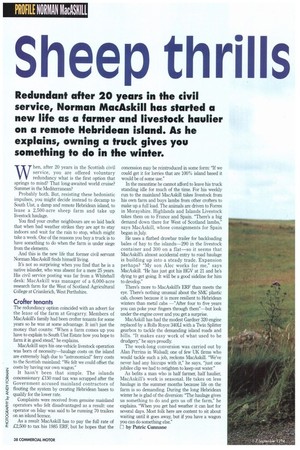Sheep thrills
Page 40

If you've noticed an error in this article please click here to report it so we can fix it.
Redundant after 20 years in the civil service, Norman MacAskill has started a new life as a farmer and livestock haulier on a remote Hebridean island. As he explains, owning a truck gives you something to do in the winter.
When, after 20 years in the Scottish civil service, you are offered voluntary redundancy what is the first option that springs to mind? That long-awaited world cruise? Summer in the Mediterranean?
Probably both. But, resisting these hedonistic impulses, you might decide instead to decamp to South Uist, a damp and remote Hebridean island, to lease a 2,500-acre sheep farm and take up livestock haulage.
You find your crofter neighbours are so laid back that when bad weather strikes they are apt to stay indoors and wait for the rain to stop, which might take a week. One of the reasons you buy a truck is to have something to do when the farm is under siege from the elements.
And this is the new life that former civil servant Norman MacAskill finds himself living.
It's not so surprising when you find that he is a native islander, who was absent for a mere 25 years. His civil service posting was far from a Whitehall desk: MacAskill was manager of a 6,000-acre research farm for the West of Scotland Agricultural College at Crianlerich, West Perthshire.
Crofter tenants
The redundancy option coincided with an advert for the lease of the farm at Grogarry. Members of MacAskill's family had been crofter tenants for some years so he was at some advantage. It isn't just the money that counts: "When a farm comes up you have to explain to South Uist Estate how you hope to farm it in good stead," he explains.
MacAskill says his one-vehicle livestock operation was born of necessity—haulage costs on the island are extremely high due to "astronomical" ferry costs to the Scottish mainland: "We felt we could offset the costs by having our own wagon."
It hasn't been that simple. The islands concessionary £150 road tax was scrapped after the Government accused mainland contractors of flouting the system by creating Hebridean bases to qualify for the lower rate.
Complaints were received from genuine mainland operators who felt disadvantaged as a result: one operator on Islay was said to be running 70 trailers on an island licence.
As a result MacAskill has to pay the full rate of £2,500 to tax his 1985 ERF, but he hopes that the concession may be reintroduced in some form: "If we could get it for lorries that are 100% island based it would be of some use."
In the meantime he cannot afford to leave his truck standing idle for much of the time. For his weekly run to the mainland MacAskill takes livestock from his own farm and buys lambs from other crofters to make up a full load. The animals are driven to Forres in Morayshire. Highlands and Islands Livestock takes them on to France and Spain. "There's a big demand down there for West of Scotland lambs," says MacAskill, whose consignments for Spain began in July.
He uses a flatbed drawbar trailer for backloading bales of hay to the islands-290 in the livestock container and 300 on a flat—so it seems that MacAskill's almost accidental entry to road haulage is building up into a steady trade. Expansion perhaps? "My son Alec works for me," says MacAskill. "He has just got his HGV at 21 and he's dying to get going. It will be a good sideline for him to develop."
There's more to MacAskill's ERF than meets the eye. There's nothing unusual about the SMC plastic cab, chosen because it is more resilient to Hebridean winters than metal cabs —"After four to five years you can poke your fingers through them" but look under the engine cover and you get a surprise.
MacAskill has had the modest Gardner 320 engine replaced by a Rolls Royce 340LI with a Twin Splitter gearbox to tackle the demanding island roads and hills. "It makes easy work of what used to be drudgery," he says proudly.
The week-long conversion was carried out by Alan Perrins in Walsall; one of few UK firms who would tackle such a job, reckons IVIacAsIdll. "We've never had any hiccups with it," he says, "just one jubilee clip we had to retighten to keep out water."
As befits a man who is half fanner, half haulier, MacAskill's work is seasonal. He takes on less haulage in the summer months because life on the farm is so demanding. During the long Hebridean winter he is glad of the diversion: "The haulage gives us something to do and gets us off the farm," he explains. "When you get bad weather it can last for several days. Most folk here are content to sit about waiting until it goes away, but if you have a wagon you can do something else."
by Patric Cunnane
























































































































